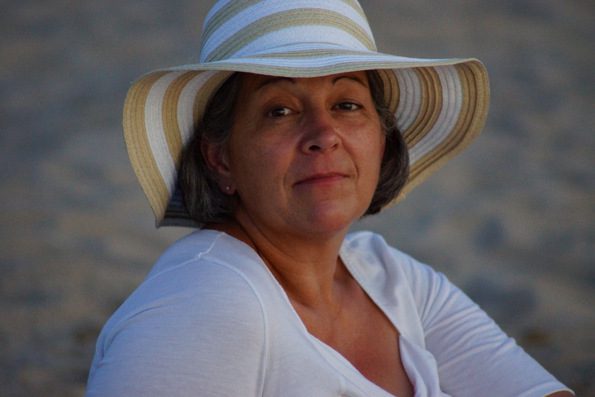
Repost from July 2013, edited and corrected
It is a warm summer day in Manistee, Michigan. A man and his wife of thirty-five years get out of their black Ford Fusion to view Lake Michigan. They love the water, and if their life’s journey had taken them on another path, perhaps they would live in a cottage on the shore of one of the Great Lakes or in a small fishing village on the Atlantic coast.
But as fate would have it, Ohio has been their home for most of their marriage. No matter where they moved, be it Texas, Michigan, or Arizona, they always came back, like the proverbial bad penny, to Ohio.
For the past six years they have lived in rural northwest Ohio, in a small community with one stoplight, two bars, two churches, a grain elevator, gas station and 345 people. They live in a town where nothing happens, and the safety and stillness that “nothing” affords is fine by them.
They have made their peace with Ohio. After all, it is where their children and grandchildren live. This is home, and it is here that they will die some moment beyond their next breath.
But from time to time, the desire to dip their feet in a vast expanse of water, to hear the waves crashing on a shore and to walk barefooted on the beach calls out to them, and off they go.
They can no longer travel great distances; four to six hours away is the limit. The man’s body is used up and broken, most days he needs a cane and some days a wheelchair to get from point to point. Long trips in the car extract a painful price from his body, a toll that is paid weeks after they have returned home.
But today, the water calls, and on a warm July day they travel to South Haven, Michigan and then up the eastern shore of Lake Michigan to Manistee. Their travels will later take them to Sault Ste Marie before they return home to Ohio.
Few people are at the Manistee beach, so unlike South Haven, where the beaches and streets are filled with pushy, bustling, impatient tourists. The man and his wife have been to South Haven many times, but as they see the scarcity of people and the quietness of Manistee they say, I think we have found a new place to stay when we vacation.

The beach is owned by thousands of Plovers. It is an amazing sight to behold. The man and his wife are mesmerized by the birds, and the man, ever possessed of his camera, begins to take pictures.
Soon the serenity of the place is ruined by a stupid boy who sees the birds as worthy of his scorn and derision. The birds are covering the landscape of HIS beach, and he will have none of that. So he runs through the mass of birds screaming and waving his arms. This put the birds into flight, complaining loudly about the stupid boy.
The man and his wife turn their attention to the pier and lighthouse in the distance. She asks, Do you think you can make it? He replies, Sure. So off they go.
As they begin their slow, faltering stroll on the pier, they notice a sign that says, No Jumping or Swimming off the Pier. The man smiles quietly to himself as he sees four teenage boys doing what the sign prohibits. He remembers long ago when he, too, would have looked at the sign and proceeded to do exactly what the sign prohibited. He thinks, the folly, wonder, and joy of youth.
As the man and his wife pass the boys in the water, one of them calls out and says, How are you today, sir? The man thought, Sir? Am I really that old? He knows the answer to the question before he asks. For a few moments the man talks with the boys, then haltingly continues to walk down the pier with his wife.
Not far from the boys, the man, and his wife come upon a pair of ducks: a male, his female, and their brood of ten young ducklings. New life. The man wonders: How many of the ducklings will survive their youth? He knows the answer and this troubles him a bit. A reminder, that, for all its beauty, life is harsh, filled with pain, suffering, and death.
The man and his wife turn back to where the boys are swimming. The man thinks, as he looks at the shallow water with its rock-filled bottom, this is a dangerous place to be diving into the water.
But the boys are oblivious to the danger. The man’s mind races back to the days of his youth, remembering a time when he too lived without fear, enjoying the freedom of living in the moment.
One of the boys climbs back up on the pier and prepares to jump into the water. The man, a hundred feet or so from the boy, points his camera toward him. The man quickly adjusts the shutter speed, focuses the lens, and begins to shoot.
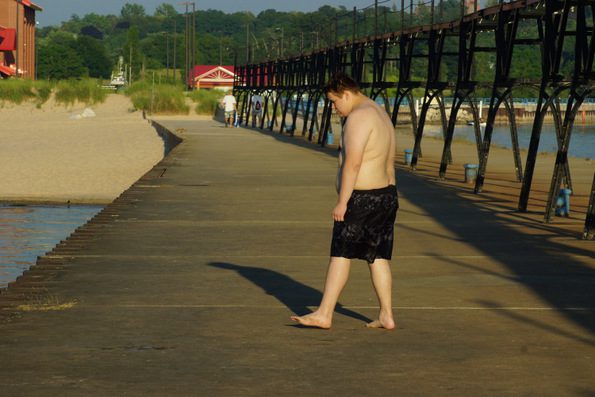
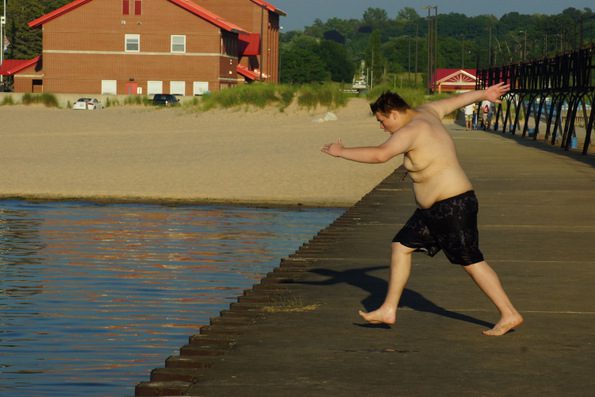
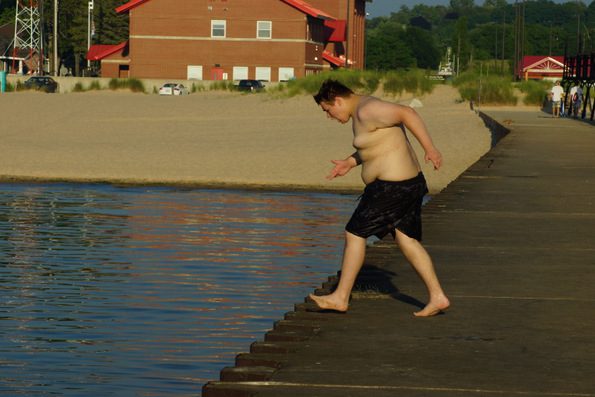
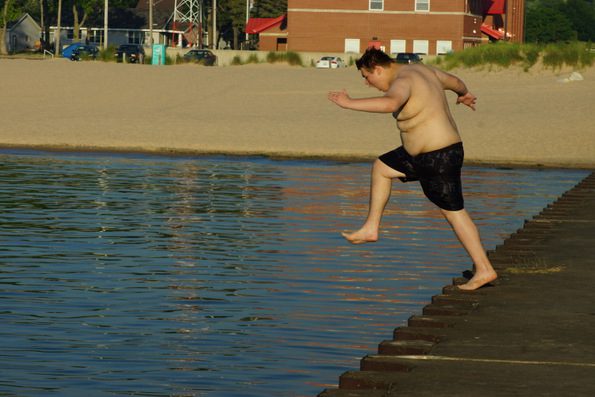
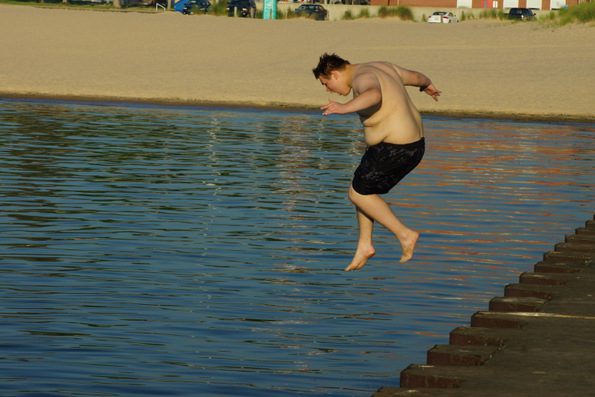
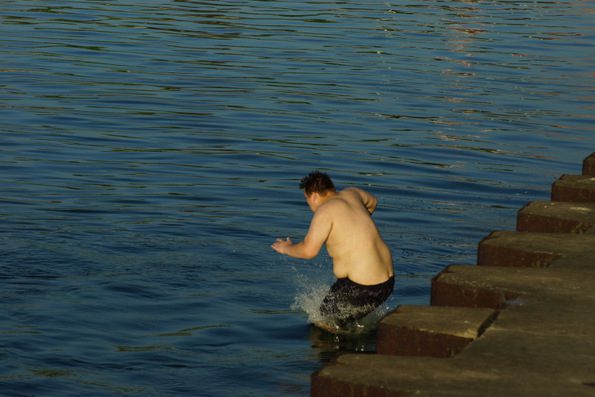
The man and his wife laugh as they watch the boy. Collectively, their minds wander back to a hot summer day in July when they joined their hands together and said, I do. Thirty-five years ago, they embraced one another and jumped off into the rock-strewn water of life, and survived.
Together they turn to walk back to the car. As they pass the boys, the man shouts, I am going to make you famous. The boys laugh and continue on with the horseplay that dominates their day.
The boys will never know that their innocence, their sign-defying plunges off a pier in Manistee, Michigan, warmed the heart of the man and his wife.
Bruce Gerencser, 68, lives in rural Northwest Ohio with his wife of 47 years. He and his wife have six grown children and sixteen grandchildren. Bruce pastored Evangelical churches for twenty-five years in Ohio, Texas, and Michigan. Bruce left the ministry in 2005, and in 2008 he left Christianity. Bruce is now a humanist and an atheist.
Your comments are welcome and appreciated. All first-time comments are moderated. Please read the commenting rules before commenting.
You can email Bruce via the Contact Form.

Lovely story.
I definitely understand the need to stand on a beach once in awhile. Nominally it is a little over an hour from my house to my favorite beach on the Northern California coast, but traffic generally makes it close to two hours of utter frustration — and that isn’t on “special event” days. And yet, there are times when I simply must go and stand at the boundary between the great water and the great land, and think about how amazing the place really is.
You know, in the old days, the signs prohibiting swimming really meant that the cops could come and chase you but nowadays with everything and his uncle being illegal, signs are merely nods to insurance companies, a liability issue. If the kid breaks his bean on a rock, well, then he was breaking the posted law SO! We make so many laws that it becomes difficult to be law-abiding unless you stay behind your front door.
Your visit to the water sounded very very rewarding. I too find it so delightful to see young people (or older types) just living and having a ball. It just feels good to be around kids playing. I like it that their occupation is play. And I am more and more amazed as the years go by, just how much energy they can expend! When I was a kid, many older people told me to ‘enjoy my youth’. I was already living my youth and so the phrase seemed a bit senseless to me and as a teen, sometimes I wanted to respond, Yeah, so if I had YOUR money, well then I could really enjoy….
Nowadays when I am lucky enough to be around young people whooping it up, I say it to myself: Enjoy your youth, Brian, and sometimes, at 63, I do… again.
I have rural property and it is posted with NO TRESPASSING signs. Now, do I really care if people go wandering through my sagebrush or climb my rocks? Of course not! I care if they do that, have an accident, and sue me. We live in a remarkably litigious society, and the risk is always there.
Being trained as a geologist, I am familiar with the problem from the other end. It can be extraordinarily difficult to map in the field if some worried property owner won’t give you permission to walk their land. But we property owners have real reason to fear.
Karen, I live on a farm in a house without insurance. Our farm has no liability insurance either so we face the very serious issues you mention. I do not have the stomach to ask everybody who visits to sign a waiver so we carry-on with the expectation that care will be taken when on this land. We live with Crown Land surrounding us and hunters sometimes request passage. We always refuse. Canada is not nearly as litigious as our neighbor to the South but we are being groomed as time goes on…
Life is what you make of it. Thank you for this beautiful post, Bruce.
Thanks, Cat. 💗💗
What a beautiful story!🌈😀
Thanks! 💗💗
Fun story! It’s nice to get out and enjoy nature.
Thanks, OC. ❤️
I really enjoyed your account of exploring the pretty parts of the Michigan Peninsula, Bruce. I believe that being on little trips and going into the wild areas is very therapeutic. Do you have one of those memory foam pads for traveling by car or train yet ? I bought one of those for my late friend to sleep on, as the small, hard beds in his RV was killing his back. One I got that pad, which covered the bed, he tried it out and felt great sleeping on it. Back pain made him cry at times, though he cried from relief after waking up pain- free. He’d been in a car accident years prior. He wouldn’t have bought this for himself, and in the early 2000’s, I’d read about it’s arrival. I hope you’ll look into it.
Hey Bruce. I guess you know Polly is wearing the official colors of The University of Tennessee “Volunteers” in that photograph. Orange and white were made for each other—-and they are pretty too. See what I mean:
https://anthropology.utk.edu/
The Department of Anthropology at UTK was my home away from home way back in my college days. Check out the professors under the Faculty tab. Maybe the fundies could take a few primate paleontology and human paleontology classes there. Maybe you and Polly—–and your readers—-could too.
Human paleontology is a fascinating subject, and it has advanced greatly across the past 45 years—-a great many more hominid fossils have been found over that period of time—-blows the Chick Tract bullshit on human evolution clean out of the water. Really!!! Take a human paleontology course at your local university. It is fun stuff.
My Human Paleontology professor was Dr. Fred H. Smith. Fred was a devout Southern Baptist who sang in the choir at his home church in Lenoir City, Tennessee, when I was his student. He did his Ph.D. studies under Dr. Milford Walpoff and Dr. C. Loring Brace at The University of Michigan in Ann Arbor. Fred’s research focused on Neanderthals, particularly Neanderthal fossil remains found in the caves of the Balkan States in eastern Europe. He later married a girl from Chicago (Dr. Maria O. Smith), and they taught at UTK and at various universities in Illinois until they retired a few years ago.
Charles, I think it is a pretty big stretch to call that orange. I see a lovely lady in a lovely beige and white hat. 😉
I love this particular piece. I could see you and Polly living an “On Golden Pond” lifestyle. Anyplace close to water is always a good spot for the good life. Put a firepit out there and you are in…Nirvana??
BTW I got called out for “supporting” you on Twitter. I wear it as a badge of honor. I can actually dialogue with people of differing viewpoints. Apparently, unlike some of my IFB contemporaries!
Thanks, Michael.❤️❤️
This is so beautiful 💖
Thanks, Jen! ❤️❤️
It looks orange to me—-but hey—-I have male red-green color blindness—–a genetic thing.
It’s definitely tan, but I’m content to let you “see” orange. 😂
Bruce, I thought I’d written it before, but apparently not: That’s a beautiful portrait of Polly. You’re a fortunate man.
Thank you! ❤️❤️